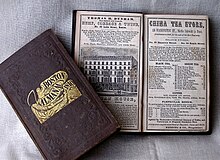
The American Peace Society is a pacifist group founded upon the initiative of William Ladd, in New York City, May 8, 1828. It was formed by the merging of many state and local societies, from New York, Maine, New Hampshire, and Massachusetts, of which the oldest, the New York Peace Society, dated from 1815. Ladd was an advocate of a "Congress and High Court of Nations." The society organized peace conferences and regularly published a periodical entitled Advocate of Peace. The Society was only opposed to wars between nation states; it did not oppose the American Civil War, regarding the Union's war as a "police action" against the "criminals" of the Confederacy. Its most famous leader was Benjamin Franklin Trueblood (1847–1916), a Quaker who in his book The Federation of the World (1899) called for the establishment of an international state to bring about lasting peace in the world. In 1834 the headquarters of the society were removed to Hartford, in 1834 to Boston, Massachusetts, in 1911 to Washington, D.C. The group is now based in Washington. Its official journal is World Affairs.
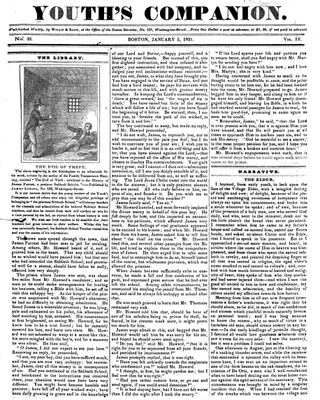
The Youth's Companion (1827–1929), known in later years as simply The Companion—For All the Family, was an American children's magazine that existed for over one hundred years until it finally merged with The American Boy in 1929. The Companion was published in Boston, Massachusetts by Perry Mason & Co., later renamed "Perry Mason Company" after the founder died. The revised name first appears on the August 9, 1900 issue. From 1892 to 1915 it was based in the Youth's Companion Building, which is now on the National Register of Historic Places.
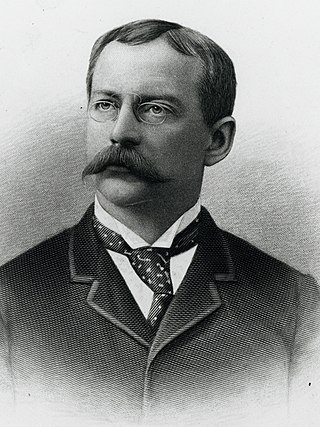
Nathan Matthews Jr. was an American politician from Massachusetts who served as mayor of Boston from 1891 to 1894.
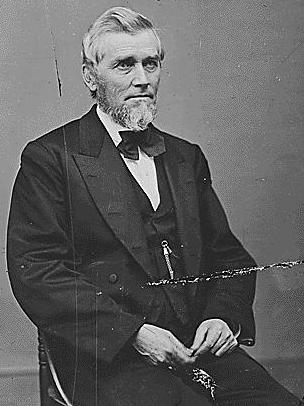
Seth Wakeman was an American attorney and politician from Batavia, New York. Initially a Whig, and later a Republican, he was most notable for his service in the New York State Assembly from 1856 to 1857 and the United States House of Representatives from 1871 to 1873.
The Boston Directory of Boston, Massachusetts, was first published in 1789. It contained "a list of the merchants, mechanics, traders, and others, of the town of Boston; in order to enable strangers to find the residence of any person." Also included were listings for public officials, doctors, bank directors, and firemen. The directory was issued annually after 1825; previously it had appeared irregularly.
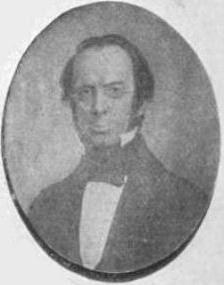
James Ross Snowden was an American politician from Pennsylvania who served as a Democratic member of the Pennsylvania House of Representatives representing Venango and Clarion counties from 1838 to 1843 and Venango, Jefferson and Clarion counties in 1844. He served as Speaker of the Pennsylvania House of Representatives in 1842 and again in 1844. He served as the Treasurer of Pennsylvania from 1845 to 1847, as treasurer of the United States Mint from 1847 to 1850 and as director of the United States Mint from 1853 to 1861.

William Croome (1790–1860) was an American illustrator and wood engraver in the 19th century. He trained with Abel Bowen in Boston, Massachusetts. Croome's work appeared in the American Magazine of Useful and Entertaining Knowledge (1830s), Lady's Annual (1830s), Crockett Almanac (ca.1840s), and in numerous children's books.

Sampson R. Urbino (1818–1896), also known as S.R. Urbino, was a book dealer, publisher, and library owner in Boston, Massachusetts, in the 19th century. He focused on books in languages other than English.
This is a timeline of the history of the city of Gloucester, Massachusetts, USA.

Tremont Row (1830s-1920s) in Boston, Massachusetts, was a short street that flourished in the 19th and early-20th centuries. It was located near the intersection of Court, Tremont, and Cambridge streets, in today's Government Center area. It existed until the 1920s, when it became known as Scollay Square. In 1859 the Barre Gazette newspaper described Tremont Row as "the great Dry Goods Street of Boston."
Louis Pierre Goullaud published and sold music in Boston, Massachusetts, in the 19th century. In the 1860s he worked for "Koppitz, Pruefer & Co." With Asa Warren White (1826–1894) and his son, Edward Warren White (1849–1896) – as the firm "White & Goullaud" – he sold musical instruments and published sheet music. Under his own imprint he issued sheet music and Goullaud's Monthly Journal of Music. He retired c. 1886, and died in Braintree on December 7, 1919.
The following is a timeline of the history of the city of Manchester, New Hampshire, United States.
The following is a timeline of the history of Lowell, Massachusetts, US.
The New-York Directory, published in 1786, was the first extant directory for New York City and the third published in the United States. It listed 846 names. A year earlier, the first two in the country were published in Philadelphia – the first, compiled by Francis White, was initially printed October 27, 1785, and the second, compiled by John Macpherson (1726–1792), was initially printed November 22, 1785.

The 93rd Massachusetts General Court, consisting of the Massachusetts Senate and the Massachusetts House of Representatives, met in 1872 during the governorship of Republican William B. Washburn. Horace H. Coolidge served as president of the Senate and John E. Sanford served as speaker of the House.
The 60th Massachusetts General Court, consisting of the Massachusetts Senate and the Massachusetts House of Representatives, met in 1839 during the governorship of Edward Everett. Myron Lawrence served as president of the Senate and Robert Charles Winthrop served as speaker of the House.
The 63rd Massachusetts General Court, consisting of the Massachusetts Senate and the Massachusetts House of Representatives, met in 1842 during the governorship of John Davis. Josiah Quincy Jr. served as president of the Senate and Thomas H. Kinnicutt served as speaker of the House.
The 64th Massachusetts General Court, consisting of the Massachusetts Senate and the Massachusetts House of Representatives, met in 1843 during the governorship of Marcus Morton. Phineas W. Leland and Frederick Robinson served as presidents of the Senate and Daniel P. King served as speaker of the House.
